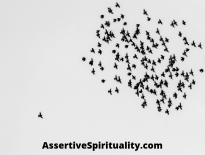
Stress and Conflict; Or, Why We All are So on Edge
I’ve been seeing the symptoms of the stress of this particular political moment for a long time. Lately I’ve seen a lot of “friendly fire” recently breaking out in online groups trying to make the world a better place. In this article, I’ll discuss what living through this kind of stress has been feeling like for me lately in light of the research on stress, trauma and conflict communication. In the process, hopefully I’ll be able to articulate more of the internal dynamics that lead to everyone being so reactive these days. In other words, I will unpack at least a few of the connections between stress and conflicts (spoiler: the connection is often shame).
NOTE: Your neuroses are likely to be slightly different from mine, and you may or may not be aware of your visceral reasons for being on edge these days. That doesn’t mean that similar dynamics might not be happening with you and/or those around you. We’re all vulnerable to stress, shame, and emotional contagion. And those factors lead to a lot of the toxic conflicts we experience and see around us.
The Emotional Expertise of Being Highly Sensitive
See, as I believe I’ve mentioned before, I’m one of those people that tends to absorb ALL the stress in the room. This is both a gift and a curse. The gift part means I’m able to see the toxic signs of the toxic kinds of emotional contagion.
And yes, that means the visceral emotions that are the result of this current political situation in the US, and its outflow to those I interact with, pool in my body. Here at the end of a semester of university teaching, the students’ stresses about finishing up add to mine about that and the political situation and it’s created this perfect storm of feeling completely overwhelmed.
There are, of course, physiological outcomes. My muscles get tight. I have to spend time rolling out my muscles just to avoid seizing up too completely. My chiropractor earns her keep these crazy stressful weeks around the end of the semester, especially when the political situation is this stressful, etc.
In Which the Neuroses Come Out Under Stress
Once I feel physically overwhelmed, all the insecurities and shame triggers inevitably also get unearthed.
The often-accurate part of these perceptions, the part that I know I can rely on, for the most part, is that my internal editor and communicator becomes less reliable during extreme stress.
This makes me super nervous about disclosing things, especially online–because as I mentioned before, I’m a pastor’s kid. That package deal came with neuroses about disclosure and surveillance anyway. (They also, ironically, mean that I’m better than I think I am about holding the line on editing myself during these times. Lots of contradictions swimming in me at stressful times.)
And the recovering perfectionist pops back in as well. Because of course our culture’s shame system likes to tell us (in a delightfully cheerful “It’s not us, it’s you” way) that it’s not the world or others that are to blame if we have too much to handle, it’s us.
And being a good student, I internalized a whole bunch of these kinds of messages a long time ago. (We all did.)
In Which I Start to Interpret the Stress as the Bad Kind
And so yes, being human and all, as the pressure is applied, all of these messages that I learned so well pop their way out into my body and psyche as bad stress and shame.
They both are and are not me, these messages.
Sure, they initially came from outside, but now they’re pretty intimately connected to me. I’ve been trying to distance myself from them, but they come out at times like these.
I don’t like them. Many of these messages are toxic–and at times of stress I tend to want to remove them all from my body without sorting through them. It feels impossible to discern what is good and bad among the emotions and thoughts and feelings, and much too much sorting work to deal with.
So when I’m under stress, I often blame the stress itself for them coming out (which is sort of true and sort of not—it’s sort of like blaming the pipes for bringing you sludge). And of course I blame myself for not banishing them in the first place.
As I start to feel overwhelmed, I seek support, sure. But that support starts to never feel like enough. I try not to take it out on those around me, especially my support people. I try to spread these requests out. I tell myself it’s the end of the semester and I’m juggling two things in the midst of a crazy political moment in history, so I just need some sleep.
Being on a Tightrope with Impostor Syndrome
So yeah, it starts to feel like I’m walking on a tightrope, or standing on the edge of a cliff, or something. AFTER I’ve had a few glasses of wine.
And I start to get impostor syndrome. You know, that thing that even Michelle Obama just recently admitted she has—that feeling of being a fake and not belonging or having expertise or purpose in the world.
And let me tell you, this impostor syndrome, when it comes, does not localize in just one area of my life. And it doesn’t stick to that often-accurate but not completely accurate impression that I should give myself more time when editing my communications.
And so yes, I start not to trust myself at all. And that makes it really hard to manage myself in all areas. To do my work of all kinds, but also to be a good relational partner in a wide variety of relationships. Which doesn’t help because my stress hormones are both calling me to reach out to others for support and withdraw at the same time.
The Double-Whammy: Distrusting Self AND the World
The thing is, it’s not just me that I feel to be untrustworthy at these times. My potential-danger sensors are on high alert as well.
My internal voices are also reminding me of all the ways others have hurt me in the past, and they’re warning me in both valid and slightly overblown ways that the world is out to get me.
So yeah, at times like these I become really aware of all the ways I don’t trust the world as well as myself. And yes, some of these perceptions are accurate, and some just aren’t. (To figure that out, I need to pull back and do some detective work, which is often harder for me than usual during these moments.)
Anyway, my increased sense of distrust, combined with my accurate perception of having a lower quality editor than usual and shame over feeling seemingly inexhaustible need for social support I feel nervous about both soliciting and relying on, can absolutely lead to me being snippy with others, especially those I’m closest to. This can sometimes lead to arguments and poor interactional quality. Poor impulse control.
And then of course if I hurt those I’m supposed to care for, the fear of disconnection that comes from shame REALLY kicks in properly.
Being Vulnerable
The long and short of it is, it is completely accurate for me to feel off-center at these times of stress. Because at these times I feel, and am, really vulnerable. As the great shame and vulnerability researcher Brene Brown reminds us in her fabulous book Daring Greatly, the dictionary definition of this means we’re open to attack or wounding. It does not mean we’re weak, but it often does mean that some of our soft spots that are easily wounded are potentially exposed for attack, because that’s what courage looks like.
The truth is that I am being courageous in these times, and occasionally am exposing weakness as well. Both things are often true at once.
I got into this situation, after all, by courageously taking on a lot as well as being handed a lot to deal with. But I’m a human being, so yeah, I’m unlikely to be able to be an actual superhero in these situations.
But yes, thankfully I’ve been studying this stuff for a long time, so when I feel too overwhelmed for too long, I melt down, then take a pause. I practice shame resilience by discussing a lot of this with a close friend or two or three, and look more closely at the situation, especially the messages I’m getting and the external factors contributing to my situation.
Realizing I Am Not Alone
See, in the midst of all of this, I totally get why people are getting into arguments online. I know that not everyone can feel all of the nuances of everything I just described. But these are nonetheless often the factors that are causing arguments these days, even among allies in trying to make this world a better place.
The frequency of these arguments isn’t great–it doesn’t help matters. Having studied stress and trauma, I know ALL the negative physiological ramifications of all that aggression and passive aggression and freezing out of people.
But on the other hand, I don’t really blame people too terribly for getting snippy. See, before I started to snap out of my latest shame spiral, I too, having sunk deep in my impostor syndrome, felt how close I was to being a powder keg.
Inner PK to the Rescue?
Actually, in many ways that oversensitive avoidant pastor’s kid critical voice in me that I’d been just labeling as toxic is actually quite useful during these hyper-stressful times, in that it keeps me from that reactive side lashing out more than is strictly necessary.
Because yes, conflict can be healthy and helpful, but not all forms of it are healthy and helpful. And my inner censor actually isn’t ALL toxic. It does some good work in stressful days, to push me to talk things out more with trusted relationships and in my more trusted spaces.
But my inner censor being a bit weaker isn’t entirely bad either, mind you. Sometimes these times of felt instability have been great for pushing my recovering-avoidant self to bring up valuable conflicts that needed to be brought up. Learning to prize that side of me has been particularly difficult.
(I’m sure not everything I said during this time was perfect, by a long shot, by the way. But I’m told I often sound much more reasonable and articulate than I feel. I do apologize if I was unwarrantedly snarky to you during the last few weeks.)
Trying to Walk the Tightrope
But yeah, that whole walking on a tightrope while super stressed thing? Not so easy, friends.
I know a lot of you know, because you’re going through it too, in various ways.
Surely you’ve felt the shame spirals fighting inside you as you take step by wobbly step.
Perhaps you too have felt how easy it is to forget the positive.
And maybe you’ve felt yourself in danger of seeing everyone and everything, including yourself, as an unstable threat.
Vulnerability to Arguments at This Time
Possibly you too have found yourself in the middle of a debate or argument around this point. Likely you didn’t mean to get there. But you are now. Your physiology is pumping. You may even be back in an unpleasant situation from your past—you can’t quite tell which one, but you can feel the physiology responding.
Here’s the thing, friends. This crap is not easy—and it doesn’t mean you’re not enough if you’re having trouble handling all of it. It’s more than we’re supposed to handle. This environment we’re in, and the abusive systems and leaders we’re dealing with, literally hurt people with the hateful rhetoric and policies they put out.
And on top of that, when we have stressful personal and professional and/or relational circumstances? Sheesh.
Just…sheesh.
Vulnerability Means You’re Doing Challenging Things
Here’s the encouragement I have to offer you from the tightrope, on the other side of the worst shame spiral, just before I try to catch a rest before taking a few more wobbly steps: you are not alone if you’re struggling with all of this. And you’re not crazy. And it’s not your imagination that so many nerves are fraying. That those you previously deemed safe might be lashing out or stepping away, etc.
It’s not easy, all of this. That’s the way our bodies work–and those who are stirring up all of this stuff know that at some level, and are trying to increase the divisions. Let’s do our best to courageously not give them the satisfaction of hurting our allies and ourselves more than necessary. And recognize none of us are likely to deal with this perfectly.
Rest, Don’t Quit
So let’s catch some rest, friends, as we need to, in order to keep those helpful inner self monitors engaged enough to keep us from hurting each other. But as Banksy says, “Rest, don’t quit.” Remember, it’s a marathon relay, this fight, and we all can do a little, at least. As we can, where we are, with what we’ve got.
Go team #AssertiveSpirituality! We really can do this thing. Even writing this is helping me feel better (it’s always amazing how naming emotions, completing tasks, and encouraging others and yourself can work together for good!).
Oh, and if you’re needing some more specific tricks and tools to deal with all the reactivity, online and off? Sign up in the top bar of this site for the weekly email newsletter and after you confirm your email address you’ll receive a link to the “Assertive Spirituality Guide to Online Trolls.” You can unsubscribe at any time, but you’ll also receive the weekly blog articles and project news, so I hope you’ll want to continue.


4 thoughts on “Stress and Conflict; Or, Why We All are So on Edge”
Thank you for this – I am experiencing many of these feelings!! I hope you’ve gotten some rest – Merry Christmas!
You’re welcome–and thanks for the encouragement! I only have a few hours of grading yet to do before I get to have some R&R, with still work to do, but at a more reasonable pace. 🙂 Merry Christmas to you as well. If you need a release valve for all the feels around Thursday, I’m coordinating a Collective Scream about All the Toxic Crap FB event that anyone can participate in from wherever they are, with whoever’s around. Get more details and RSVP at https://www.facebook.com/events/214664532746112/
Wonderful post — even though it is over 6 months old now. I am relieved to hear that someone else is going through the same inner turmoil as I am. As empaths, we take on too much of the outside world. Currently, I am writing this in August as the Amazon forest burns, and I am grieving greatly over it. And I too blog my feelings — not necessarily for my readers, but for myself! I just posted an article called ‘Stop the Burning’ that looks at this issue from another viewpoint (not mine, but one from a friend). Hang in there DS! There are many that can identify with your writings. You are making a difference!
Thanks so much! Yes, I re-ran it in the newsletter this week because I was feeling similarly and noticed it in a lot of those around me as well–and was struggling with a bug so wasn’t up to writing a new one. Hang in there as well, friend!